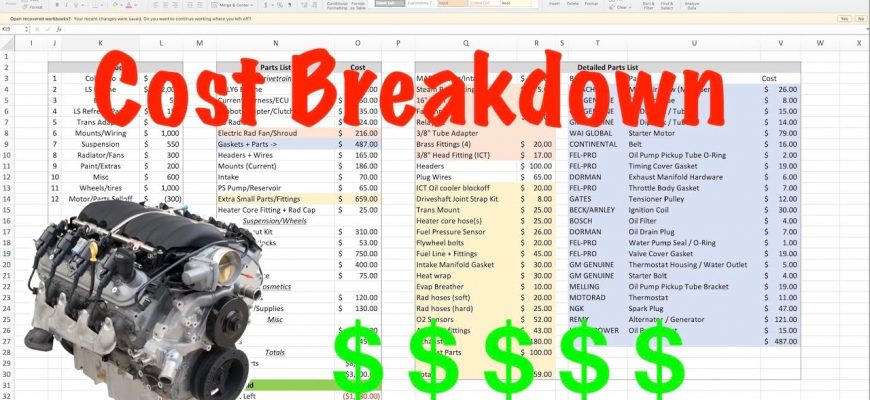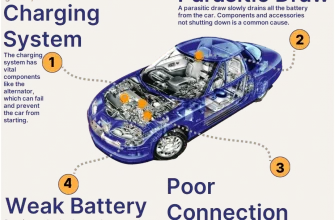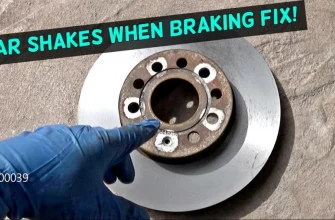When it comes to automotive customization and repairs, few projects evoke as much excitement (or apprehension) as an engine swap. Whether you’re looking to boost performance, enhance reliability, or breathe new life into an aging vehicle, swapping an engine can be a transformative experience. However, before you dive into this mechanical endeavor, it’s crucial to understand the costs involved. In this article, we’ll break down the various factors that contribute to the overall expense of an engine swap.
- 1. Understanding the Basics of an Engine Swap
- 2. Types of Engine Swaps
- 3. Cost Components of an Engine Swap
- 3.1 Engine Cost
- 3.2 Labor Costs
- 3.3 Additional Parts and Accessories
- 3.4 Miscellaneous Costs
- 4. Total Estimated Costs
- 5. Conclusion
- 6. Factors Influencing Engine Swap Costs
- 6.1 Vehicle Make and Model
- 6.2 Engine Choice
- 6.3 DIY vs. Professional Installation
- 6.4 Location
- 6.5 Additional Upgrades
- 7. Financing Your Engine Swap
- 7.1 Personal Savings
- 7.2 Credit Cards
- 7.3 Loans
- 8. Final Thoughts
1. Understanding the Basics of an Engine Swap
Before we delve into costs, let’s clarify what an engine swap entails. An engine swap involves removing a vehicle’s existing engine and replacing it with another, which can either be a newer version of the same engine or a completely different engine type. The choice often depends on the desired performance, compatibility, and personal preference.
2. Types of Engine Swaps
There are primarily two types of engine swaps:
- OEM Engine Swap: Replacing the old engine with a factory engine of the same make and model.
- Performance Engine Swap: Installing a more powerful engine from a different model or manufacturer.
3. Cost Components of an Engine Swap
The total cost of an engine swap can vary significantly based on several factors. Here’s a detailed breakdown of what you should consider:
3.1 Engine Cost
The most substantial expense in an engine swap is the cost of the engine itself. Depending on the make, model, and condition (new, used, or rebuilt), prices can range from:
- $500 to $5,000 for a used engine
- $2,000 to $10,000 for a new or high-performance engine
3.2 Labor Costs
If you’re not a seasoned mechanic, you’ll likely need to hire a professional. Labor costs can vary widely depending on location and shop rates, typically ranging from:
- $75 to $150 per hour
Expect a complete engine swap to take anywhere from 10 to 20 hours, leading to a labor cost of:
- $750 to $3,000
3.3 Additional Parts and Accessories
An engine swap often requires additional components, such as:
- Engine mounts
- Wiring harness
- Cooling system upgrades
- Exhaust systems
- Transmission modifications
The cost of these parts can add another:
- $500 to $2,500
3.4 Miscellaneous Costs
Don’t forget about other potential costs that may arise:
- Fluid changes (oil, coolant, transmission fluid)
- Diagnostics and tuning
- Shipping costs for engine delivery
These can collectively add another:
- $200 to $1,000
4. Total Estimated Costs
When you combine all these components, the total cost of an engine swap can vary widely:
Low-End Estimate: $1,950 (used engine + minimal labor + basic additional parts)
High-End Estimate: $16,500 (new performance engine + extensive labor + premium parts)
5. Conclusion
Embarking on an engine swap can be a rewarding project that revitalizes your vehicle. However, it’s essential to conduct thorough research and budget wisely to avoid any financial surprises. Always consider your goals for the project and consult with professionals to ensure you make informed decisions. With the right planning, your engine swap can lead to improved performance and a renewed love for your ride.
So, whether you’re upgrading for speed or simply replacing a worn-out engine, understanding the cost breakdown is an essential first step. Happy wrenching!
6. Factors Influencing Engine Swap Costs
While we’ve outlined the primary components that make up the cost of an engine swap, several other factors can significantly impact your overall budget. Here are some key considerations:
6.1 Vehicle Make and Model
The type of vehicle you’re working on plays a crucial role in determining costs. Popular makes and models often have readily available replacement engines and aftermarket parts, which can lower expenses. Conversely, rare or vintage cars may require custom solutions that can skyrocket costs due to limited availability of parts.
6.2 Engine Choice
Your choice of engine not only affects the price but also dictates how straightforward the swap will be. For instance, swapping in a newer engine from the same manufacturer may require fewer modifications compared to installing an entirely different engine. Performance engines often necessitate additional upgrades, such as improved transmission systems and cooling solutions, further adding to costs.
6.3 DIY vs. Professional Installation
Are you a seasoned DIY enthusiast, or do you prefer the expertise of professionals? Tackling an engine swap on your own can save a significant amount in labor costs, but it requires mechanical skills, tools, and time. If you choose to hire a professional, ensure you research to find a reputable mechanic with experience in engine swaps, as this can lead to more reliable work and avoid costly mistakes.
6.4 Location
Your geographical location can also influence costs. Urban areas may have higher labor rates due to increased demand for skilled mechanics, while rural areas may provide more competitive pricing. Additionally, the availability of specialized shops can impact both the cost and quality of the work performed.
6.5 Additional Upgrades
An engine swap is often the perfect opportunity to upgrade other components of your vehicle. Consider the benefits of enhancing your suspension, brakes, or exhaust system alongside the new engine. While these upgrades can increase your initial investment, they may provide better performance and longevity, making the overall project more worthwhile.
7. Financing Your Engine Swap
For many, the cost of an engine swap may seem daunting. However, there are several options for financing this type of project:
7.1 Personal Savings
Using savings is the most straightforward way to fund your engine swap. This approach allows you to avoid debt and interest payments while ensuring you have full control over the budget.
7.2 Credit Cards
If you’re comfortable using credit, consider financing your engine swap with a credit card. Just be mindful of interest rates and ensure you can pay off the balance promptly to avoid accruing high costs.
7.3 Loans
Personal loans can provide the necessary funds for your engine swap without straining your budget. Compare different lenders to find a loan with favorable terms and interest rates that suit your financial situation.
8. Final Thoughts
Undertaking an engine swap can be an exhilarating journey, blending the challenge of mechanical work with the excitement of enhanced performance. By understanding the various costs involved, from the engine itself to labor and additional parts, you can better prepare for this transformative project. Remember, meticulous planning and research will not only help you manage expenses but will also ensure that your engine swap fulfills its promise of reinvigorating your vehicle.
As you embark on this adventure, keep in mind that the joy of driving a newly powered car is well worth the investment. Happy swapping!










The explanation of OEM vs. Performance Engine Swaps was clear and concise. This article is a must-read for anyone considering an engine swap!
This article demystifies the process of engine swapping beautifully. The tips on hiring a mechanic were particularly useful!
Great information on what to expect during an engine swap! I appreciate the detailed cost analysis—it’s super helpful for budgeting.
I loved how the article broke down the various factors affecting costs. It
I found the section on labor costs particularly helpful. It’s great to know what to expect before diving into an engine swap project.
Fantastic read! The insights on engine condition and pricing were very enlightening. I feel more prepared for my upcoming swap.
This article provides a comprehensive overview of engine swaps. I appreciate the breakdown of costs and types of swaps. Very informative!